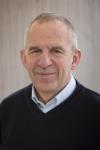Michel Devoret
Michel graduated from Ecole Nationale Superieure des Telecommunications in Paris in 1975 and started graduate work in molecular quantum physics at the University of Orsay. He then joined Professor Anatole Abragam’s laboratory in CEA-Saclay to work on NMR in solid hydrogen, and received his PhD from Paris University in 1982. He spent two post-doctoral years working on macroscopic quantum tunneling with John Clarke’s laboratory at the University of California, Berkeley. He pursued this research on quantum mechanical electronics upon his return to Saclay, starting his own research group with Daniel Esteve and Cristian Urbina. The main achievements of the “quantronics group” were in this period the measurement of the traversal time of tunneling, the invention of the single electron pump (now the basis of a new standard of capacitance), the first measurement of the effect of atomic valence on the conductance of a single atom, and the first observation of the Ramsey fringes of a superconducting artificial atom (quantronium). He became director of research at the Commissariat a l’Energie Atomique (CEA) at Saclay. In 2007, Michel has been appointed to the College de France, where he taught until 2012. Michel is a member of the American Academy of Arts and Sciences (2003) and a member of the French Academy of Sciences (2008). Michel has received the Ampere Prize of the French Academy of Science (together with Daniel Esteve, 1991), the Descartes-Huygens Prize of the Royal Academy of Science of the Netherlands (1996) and the Europhysics-Agilent Prize of the European Physical Society (together with Daniel Esteve, Hans Mooij and Yasunobu Nakamura, 2004). He is also a recipient of the John Stewart Bell Prize, which he received jointly with Rob Schoelkopf in 2013. In 2014, he has been awarded, together with John Martinis and Rob Schoelkopf, the Fritz London Memorial Prize.
Currently the F. W. Beinecke Professor of Applied Physics at Yale University (which he joined in 2002), he focuses his research on experimental solid state physics with emphasis on quantum mechanical electronics or “quantronics”. In this new type of electronics, electrical collective degrees of freedom like currents and voltages behave quantum mechanically. Such mesoscopic phenomena are particularly important in the realization of quantum information processing superconducting devices based on Josephson junctions, which is his main research goal. He currently focuses on the new phenomena of fault-tolerant quantum memory and remote entanglement.
